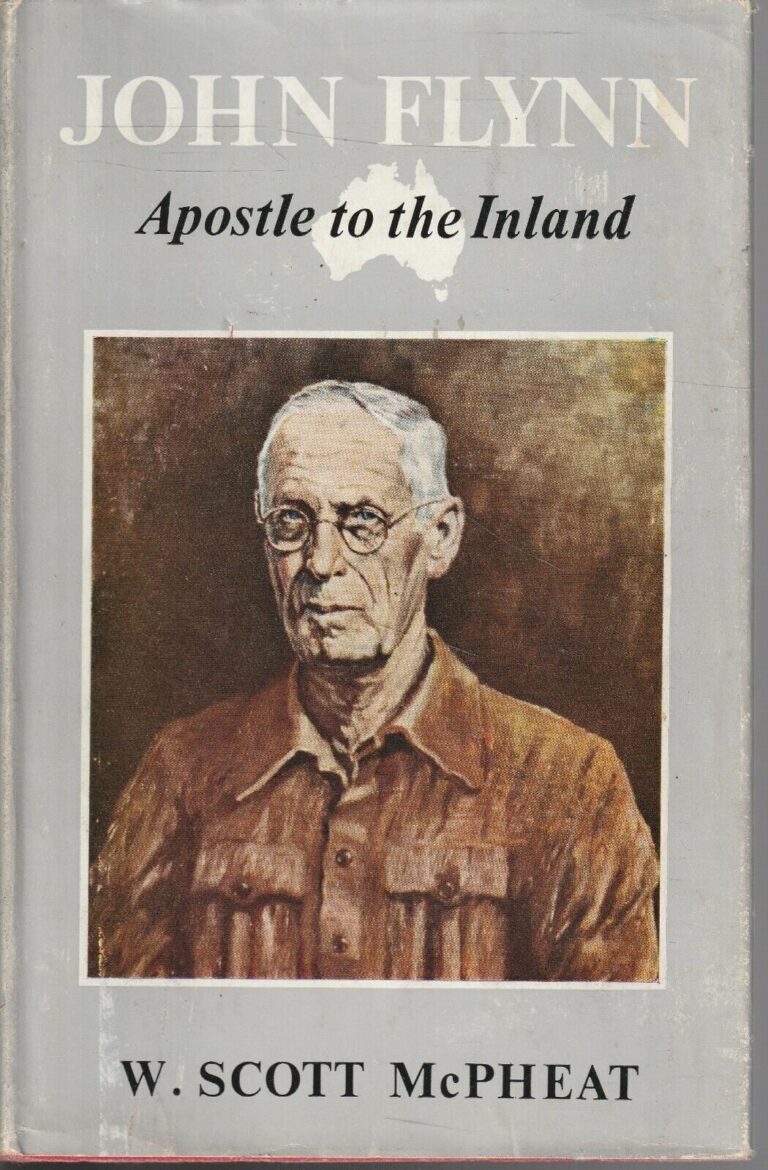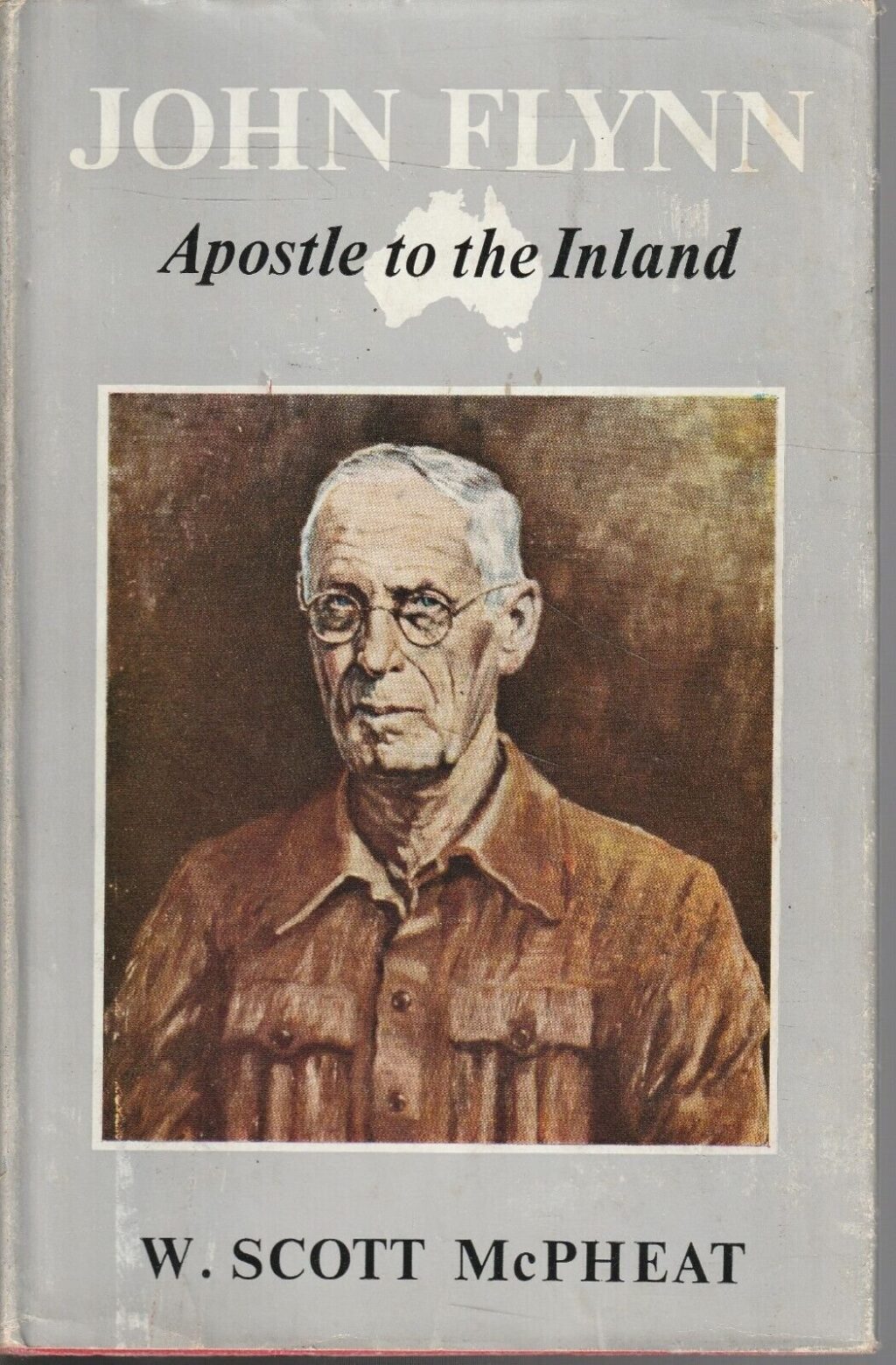W. Scott McPheat, John Flynn: Apostle to the Inland (1963)
John Flynn was a Presbyterian Minister, founder of the Australian Inland Mission, and the pioneer behind the iconic Royal Flying Doctor Service, who has been immortalised on the Australian $20 note.
Born in 1880 as the son of a school teacher in Victoria, he attended University High School in Carlton but did not have the money to study at the institution itself. Instead, he became a pupil-teacher with the Victorian Education Department before taking up a spiritual calling. While receiving training he served in the pioneering districts of Beech Forest and Buchan, before volunteering to join the Smith of Dunesk Mission in the northern Flinders Ranges, South Australia in 1911. The next year Flynn surveyed the Northern Territory and soon decided to minister to not only it, but also the remote areas of South Australia, Western Australia, and Queensland, forming the Inland Mission. When the mission commenced operations Flynn had just one nursing sister, one padre, a nursing hostel and five camels to serve much of the territory of the island continent.
From the outset, it became clear that the Mission’s goals would be more focused on delivering desperately needed medical services ‘without preference for nationality or creed’ than spreading the Gospel. This was obviously a logistical nightmare, but through hard work and dedication Flynn was able to gradually build a vast network of nursing hostels and hospitals. He could see from an early date the potential of mechanical flight to vastly improve his ability to get medical help to where it was needed in an emergency, and as early as 1928 he established the Aerial Medical Service at Cloncurry facilitated by the equally crucial technology of the pedal radio. Flynn had a penchant for photography, and through the Mission’s magazine the Inlander he was able to draw attention to both the need for and the inspiring potential of Northern Territory development (which coincidently was also a passion of Menzies’s uncle Sydney Sampson). This helped Flynn convince QANTAS to lease him a De Havilland 50 aircraft on very favourable terms, and from there with the backing of several governments and numerous private philanthropists the Royal Flying Doctor Service was able to grow into an Australian institution and an essential service for an almost uncountable number of remote communities.
By the time he passed away from cancer in 1951, Flynn was a household name. He requested that his ashes be interred at the foot of Mt Gillen, Alice Springs and three years later Prime Minister Robert Menzies made a historic visit to the town to lay the foundation stone of the Flynn Memorial Church. This was a most memorable and emotional occasion for the region, and the crowd of 3000 people who turned out to witness it was said to be the largest civilian gathering that had ever been held in central Australia. Menzies gave a short speech in which he declared:
‘Flynn was not only a great man, he was a good man who will be remembered in history as one who worked all his life to better the lot of his fellows. There have been many great men in this century, some whose greatness will be remembered as long as history is written for their infamous wickedness. But John Flynn worked only for the good of mankind. He combined two qualities rarely found in one man – he had vision and the executive ability to get things done.’
This was followed by an impromptu radio broadcast delivered over the Flying Doctor network, which allowed Menzies to speak to all those whose lives had been touched by the great Australian. A Presbyterian himself, Menzies was naturally drawn towards Flynn and the Menzies Collection contains two copies of Apostle to the Inland (the author of which was himself a minister), one copy being inscribed with ‘God bless you’, as well as an earlier work titled Flynn of the Inland.
We do not know the extent to which Menzies knew Flynn personally, but Menzies was incredibly close to Flynn’s successor as head of the Inland Mission Fred McKay. A ‘spiritual confidant’, McKay conducted Menzies’s daughter’s wedding, his son Ian’s burial, and Menzies’s own state funeral held at Melbourne’s Scots Church. In Menzies’s final days he shared a special moment with the clergyman, who clasped Menzies’s hand and said, ‘God be with you, Bob’, to which Menzies replied with the Aaronic blessing from Numbers 25:6, ‘And with you, and may He make His face to shine upon you, and be gracious unto you’.
You might also like...
Sign up to our newsletter
Sign up for our monthly newsletter to hear the latest news and receive information about upcoming events.



